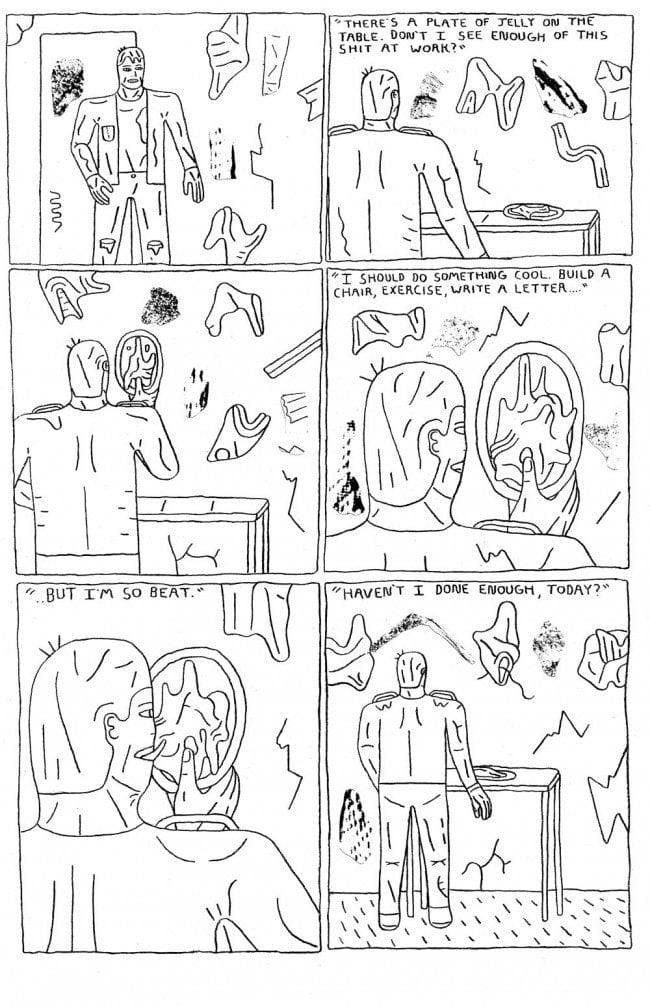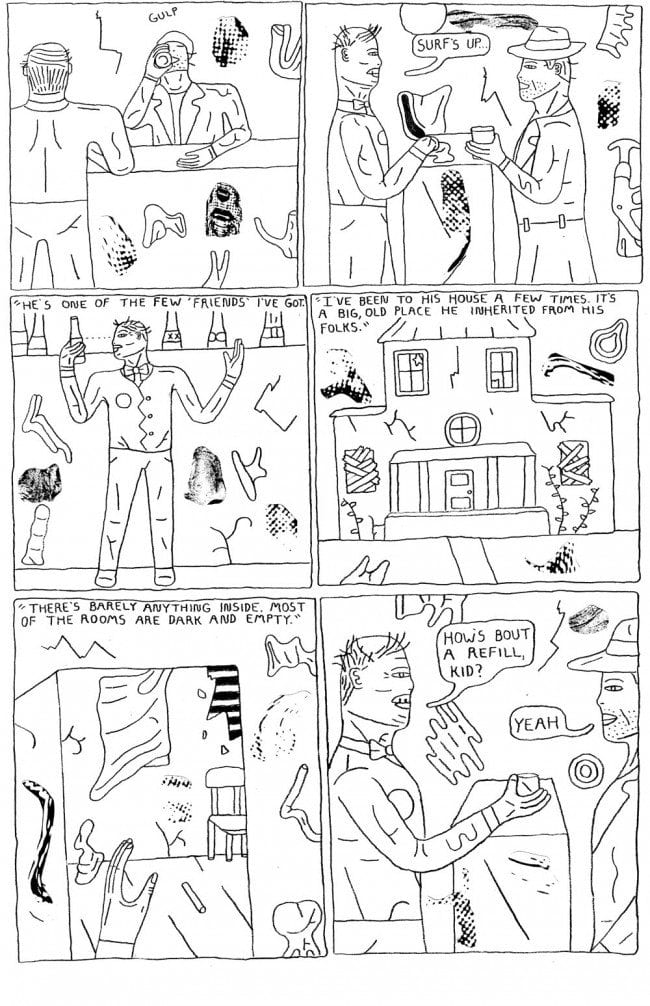There is a rich tradition of cartoonists, novelists and filmmakers creating fictional towns that function as microcosms to which we can hold up a magnifying glass and examine ourselves. On these small stages, characters bump up against one-another and act out big human dramas. The towns are isolated but not entirely cut off from the wider world, and outside influences creep across their porous borders and often bring trouble. Think David Lynch’s Twin Peaks, Gilbert Hernandez’s Palomar, George Eliot’s Middlemarch or Matt Groening’s Springfield.
In his new book Test Tube, Carlos Gonzalez has populated the small town of Lensburg with a multitude of lonely, anxious, creatively frustrated souls who all seem to be yearning for a brush with transcendence. Peter Yolk is a projectionist at a second-run movie theater. His only friend is Richard Penny, the bartender at a girlie club called the Dollhouse, an establishment frequented by many of the characters in the book. A man named Jeff works at a diner called the Lensburg System, which is perhaps a reference to the New York System, a diner in Olneyville, Gonzalez’s own neighborhood in Providence, Rhode Island. After work, Jeff returns home exhausted and unable to do anything but stay up into the wee hours watching wrestling and B-movies on television. At one point Jeff states “I get high every night. It’s great. Sometimes I see shit. It never bugs me out though. There’s way more real stuff in life to be scared of.”
 That’s a large part of what makes this book so compelling. The town of Lensburg, modeled on any small American town, acts as a solid, real-world foundation from which the artist can depart to test the boundaries of science fiction, and test them he does. The primary action of Test Tube (which was originally released between 2012 and 2013 as three self-published zines and has now been collected in a beautiful edition by Floating World Books) follows three characters: a woman named Jill, the poet Gene Dennel, Jill’s boyfriend whom she meets at her booth in the flea market selling records, and the deceased doctor Robert Flask, who we first encounter speaking on an old VHS tape. An unnamed reporter for the Lensburg Examiner, who has ambitions to write on a national stage, has been relentlessly following leads to uncover information about these three mysterious characters.
That’s a large part of what makes this book so compelling. The town of Lensburg, modeled on any small American town, acts as a solid, real-world foundation from which the artist can depart to test the boundaries of science fiction, and test them he does. The primary action of Test Tube (which was originally released between 2012 and 2013 as three self-published zines and has now been collected in a beautiful edition by Floating World Books) follows three characters: a woman named Jill, the poet Gene Dennel, Jill’s boyfriend whom she meets at her booth in the flea market selling records, and the deceased doctor Robert Flask, who we first encounter speaking on an old VHS tape. An unnamed reporter for the Lensburg Examiner, who has ambitions to write on a national stage, has been relentlessly following leads to uncover information about these three mysterious characters.
 What he learns while flying around the small town in his technologically marvelous transport cube is shocking. Twenty years before the action in the story takes place, Doctor Flask and Gene Dennel had been working together on a project to speed the process of human evolution. They believed that if the experimental poems of Dennel were read aloud at the correct frequency, the poems would cause a beneficial genetic mutation in the listener. To that end, they genetically engineered a child with a voice that could produce the tone necessary to effect the mutations. That child grew up to be Jill, Dennel’s current girlfriend. Initial tests of the process were a disaster. Doctor Flask hung himself and Gene Dennel was committed to an asylum. But could the experiments be reprised with different results? I won’t spoil the ending. In fact, there’s absolutely no way to spoil this book, because it’s so full of mind-bending art and visual energy that it almost defies description.
What he learns while flying around the small town in his technologically marvelous transport cube is shocking. Twenty years before the action in the story takes place, Doctor Flask and Gene Dennel had been working together on a project to speed the process of human evolution. They believed that if the experimental poems of Dennel were read aloud at the correct frequency, the poems would cause a beneficial genetic mutation in the listener. To that end, they genetically engineered a child with a voice that could produce the tone necessary to effect the mutations. That child grew up to be Jill, Dennel’s current girlfriend. Initial tests of the process were a disaster. Doctor Flask hung himself and Gene Dennel was committed to an asylum. But could the experiments be reprised with different results? I won’t spoil the ending. In fact, there’s absolutely no way to spoil this book, because it’s so full of mind-bending art and visual energy that it almost defies description.
There is an echo of Samuel R. Delaney’s Babel 17 in the story concept, and I know Gonzalez is an avid consumer of science fiction books, comics and movies. He has cited Marvel creators Jack Kirby and Jim Shooter as artistic influences, as well as his long-time friend and collaborator CF. There are abstract drawn and collaged elements in the backgrounds of his panels that call to mind Surrealist artists like Max Ernst. Gonzalez is little concerned with conventional figure drawing, and his characters look almost sculptural, evoking Rory Hayes and Fletcher Hanks, two visionary American cartoonists working at the fringes of the medium. But rather than borrow directly from any one source, he has achieved what should be the goal of any serious cartoonist: a beautiful synthesis of many diverse influences to create a work as thoughtful and unique as the artist themselves.
 The New Yorker theater critic Hilton Als, in a recent review of Ivo Van Hove’s staging of Arthur Miller’s play View From the Bridge, states that “…what the hysteric is crying out for, in wave after verbal wave, is a transformative experience-something that cannot be explained but which will change one’s body and soul and thus experience of the world.” This is exactly what Carlos Gonzalez’s characters, trapped in the confines of small-town America, seem to be longing for. I would argue it’s the function of art. I know it’s what I’m longing for, and if you’re longing for such an experience, I suggest you pick up a copy of Test Tube and let it move you.
The New Yorker theater critic Hilton Als, in a recent review of Ivo Van Hove’s staging of Arthur Miller’s play View From the Bridge, states that “…what the hysteric is crying out for, in wave after verbal wave, is a transformative experience-something that cannot be explained but which will change one’s body and soul and thus experience of the world.” This is exactly what Carlos Gonzalez’s characters, trapped in the confines of small-town America, seem to be longing for. I would argue it’s the function of art. I know it’s what I’m longing for, and if you’re longing for such an experience, I suggest you pick up a copy of Test Tube and let it move you.







